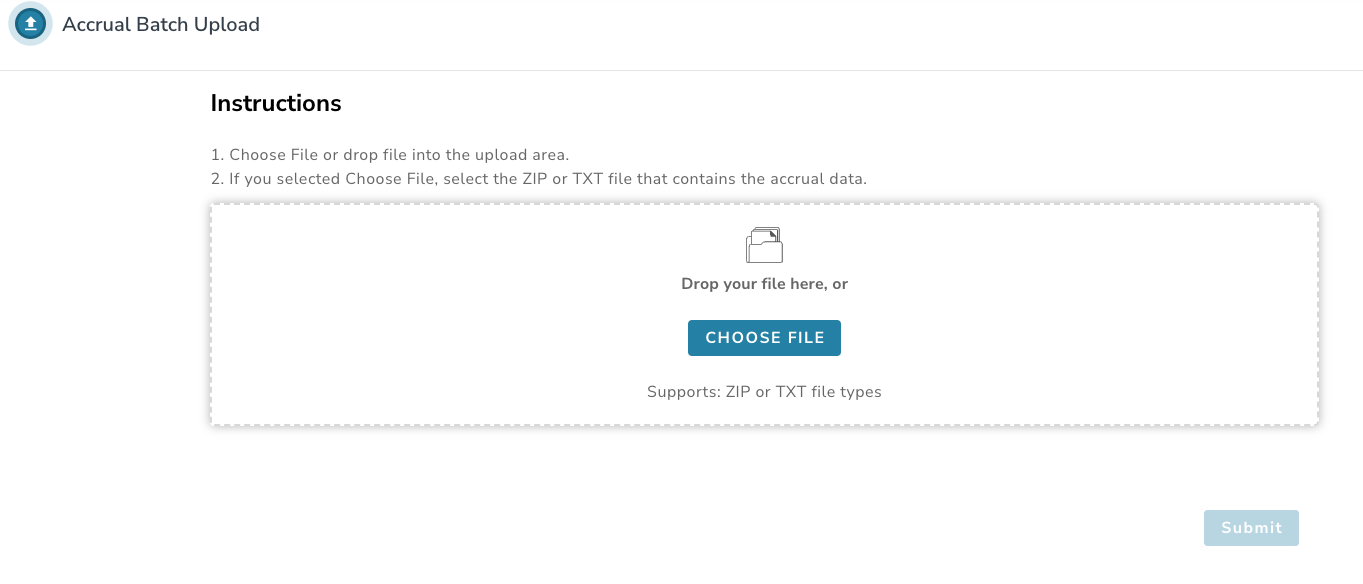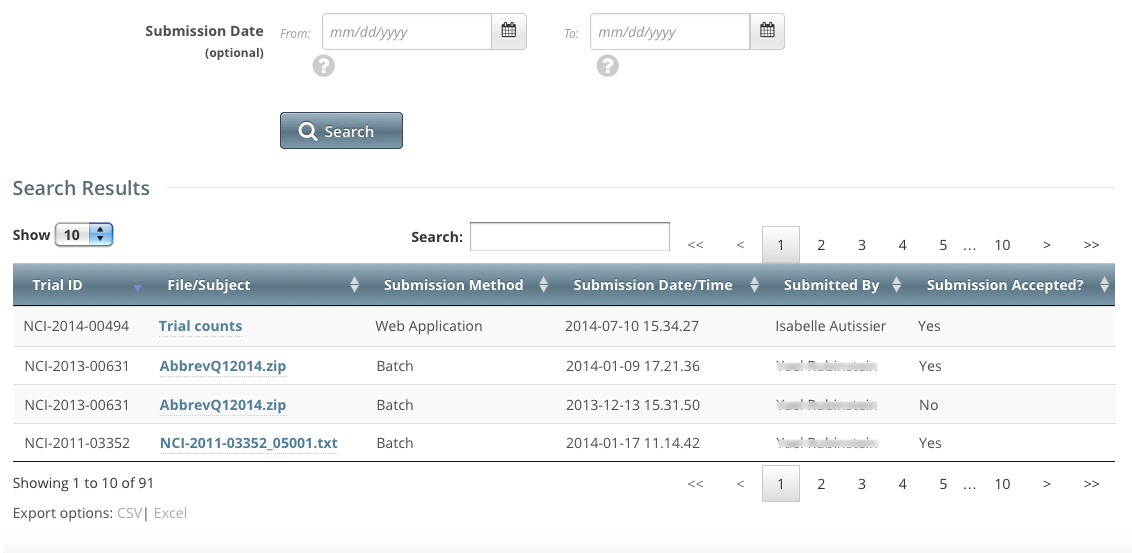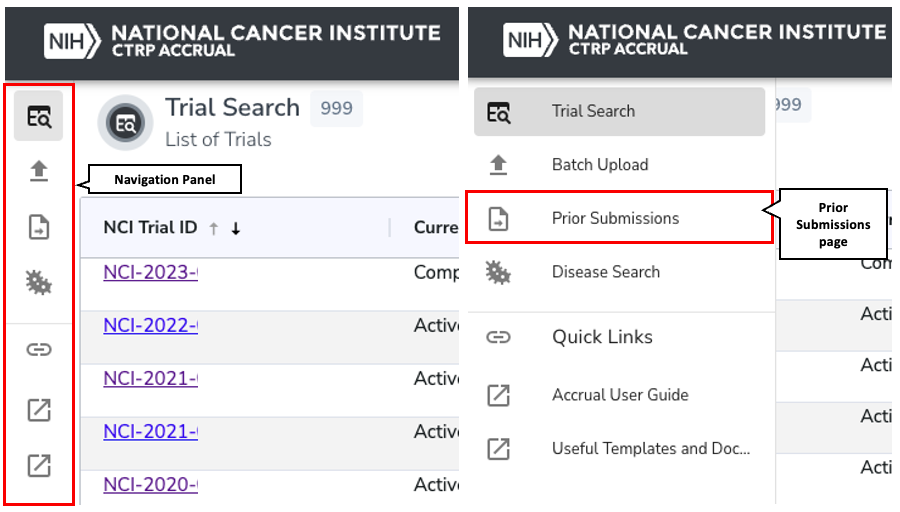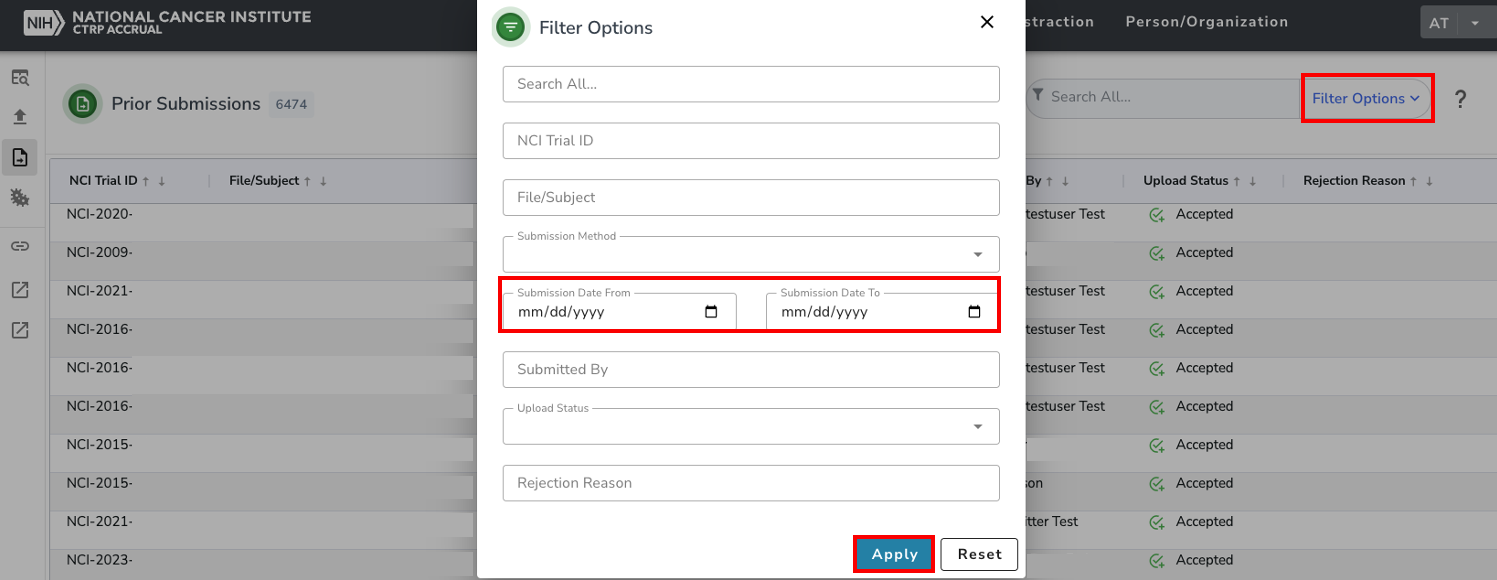CTRP application users can ignore this page altogether; it is simply a wiki shortcut.
This page displays links to subject matter that is included, in context, in many of the web pages that constitute the CTRP application user's guides.
Getting Help
This page contains select topics that help you to understand and use the NCI CTRP Accrual Site. You can find more comprehensive documentation in the NCI CTRP Accrual User Guide.
If you are experiencing technical issues with the CTRP web application, or if you have questions, contact us at ctrp_support@nih.gov. When submitting support requests, include:
- Your contact information, including your telephone number
- The name of the application/tool you are using
- The relevant URL
- A description of the problem and steps to recreate it
- The text of any error messages you have received
For other CTRP topics, contact the Clinical Trials Reporting Office (CTRO) at ncictro@mail.nih.gov.
About CTRP Accrual
The CTRP Accrual web application provides authorized members of the cancer research community with access to cancer clinical trials registered with the CTRP for the purpose of reporting accrual data for clinical studies. It enables users to enter accrual based on the trial category: Complete (National, Externally Peer-Reviewed, or Institutional trials), or Abbreviated (Industrial or Other trials). For information on these types, refer to CTRP Trial Categories, Study Sources or https://cancercenters.cancer.gov/GrantsFunding/eData#dt4.
The CTRP Accrual web application allows users to enter the following types of accrual data:
- Patient level: Study subject demographic data for Externally Peer-Reviewed and Institutional trials. (Accruals for National trials are reported internally at NCI.)
- Summary level: Patient accrual counts for Abbreviated trials that have been abstracted (that is, trials that have been fully abstracted) as well as those that have been approved or withdrawn.
Searching for Trials in Accrual
If you do not see any studies listed when you log in, consider the following points:
- Your CTRP user account must have authorization to report accrual data to your studies.
- Studies appear in the list after they have been registered and accepted in CTRP.
- For Complete/Protocol studies:
- The overall trial status history should include one of the open statuses.
- Studies with a status of In Review or Approved are not available in the accrual application. Once they have reached an open/recruiting status, they will be available for accrual reporting.
- The Participating Site (PS) on the study record must include one of the open/recruiting statuses before accrual can be reported.
For instructions on each of these, refer to Accrual Prerequisites.
For information on study statuses, refer to Trial Status Values in the CTRP and ClinicalTrials.gov.
Note
You can search for a study by one or more criteria, or you can list all studies to which you have been granted access by leaving all of the search criteria fields blank. If you search by the Official Title, use keywords and wildcards (%) rather than phrases for the entire title. Doing so minimizes the potential for excluding any titles with misspellings or slightly different phrasing from the search results. For example, a Phase II study may have been reported as a Phase 2 study.
Submitting Accrual Data Batch Files
Be sure to complete your batch file preparation first
Before you begin, gather all the protocol data you need. See Preparing CTRP Accrual Batch Files for instructions. The system logs you out if it detects that you have not used the application for 90 minutes.
The system locks you out after three unsuccessful attempts to log in within 24 hours. In the event that you have been locked out of your account, contact us at ctrp_support@nih.gov. If you have forgotten your password, or if you want to reset it for any reason, refer to Resetting Your Password.
Once you have created your Accrual Batch Upload file, upload it via the CTRP Accrual web interface. Existing accrual data for the study will be updated and any new data you submit will be added.
The batch upload template currently does NOT provide a way to enter accrual disease code terminology; instead, the default value of SDC is used.
The batch files you submit do not delete previously accrued patients/patient data. Use the Accrual application user interface to delete accrued subjects as necessary.
How to Upload Accrual Batch Files
- On the left-hand navigation menu, click Batch Upload
The Batch Upload page appears. Click Browse and select the .txt or .zip file that contains your accrual data.
Click Submit.
Your file is uploaded to the system and processed in the backgroundWhen processing has been completed, the system sends you an email message to inform you of the status of your file(s). It includes the information listed below. The system will also notify you if it is unable to process your Zip file.
- NCI Identifier
- Number of subject accruals that the system imported
- Details of any errors that may have occurred during the import process
The system checks your submissions to ensure there are no duplicates. The system does not process a study subject record if it detects that a participating site in the same trial has registered a subject with the same Study Subject ID. The system includes details about which Study Subject IDs are affected in an error message.
A subject is duplicate if
1. There is already an accrual with same subject id on the same PS for a trial.
2. If following attributes (subject id, dob, gender, ethnicity) match for a subject on any other PS on the trial(not including the PS accrual is added to).
Once you have uploaded your batch file, the CTRP system continues to update the record status both by email and Accrual. To view the information you uploaded, see Downloading Accrual Batch Data Files and Reviewing and Updating Prior Accrual Submissions.
Accessing Trials with Prior Accrual Records
How to Review and Modify Prior Complete Trial Accrual Submissions
- On the toolbar, click Prior Submissions.
All of your organization's prior accrual submission records to which you have been granted Accrual access are listed automatically.
The system automatically lists all trials to which you have been granted access, per the rules described in About Accessing Trials with Prior Accruals. The system displays the following information for each trial:
- Trial ID. Trial identification given to the trial when it was registered with the CTRP
- Files/Subject. Links to the following accrual details:
- Batch file (when applicable)
- Trial subjects
- Trial counts
- Submission Method. Mechanism used to submit accrual data, i.e., via Accrual (web application), batch uploads, or the Accrual service
- Submission Date/Time. Date the accrual record was either added or modified in CTRP
- Submitted by. Name of the registered CTRP user who submitted the accrual information
- Submission Accepted?. Indicates whether or not the submission was processed successfully (Yes), or there were errors in the submission (No). Immediately after submitting new or updated accrual data, the system sends you an email message that indicates whether the submission passed or failed. If the processing failed, the email message explains the nature of the errors.
Optionally, to limit the list of submissions to a date, or range of dates, in the From field, select or enter the first date of the range or the exact date of the submission you are searching for. In the To field, enter the last date of the range. Then click Search.
You can sort and filter Submission Records
To filter and sort the list of prior submissions, see Working with Accrual Tables and Search Results.
- Optionally, to export the historical accrual submission records, scroll to the bottom of the list of records, click CSV to download the records as a comma-separated-value text file, or Excel to download the records as an Excel spreadsheet. Follow your browser/operating system instructions to view or save the document.
To view a subject's demographic and submission data, in the File/Subject column, select the Study Subject ID link.
The View Study Subject page displays all the data recorded to date.To update a subject's demographic data, click the Edit icon (pencil).
Downloading Accrual Batch Data Files
Only the ZIP file submitter can download ZIP files from the Prior Submissions page.
From the Prior Submissions page, you can download previously submitted accrual files (.txt or .zip) that were uploaded via the Batch Upload feature. For information about this feature, refer to Submitting Accrual Data Batch Files.
All trials to which you have been granted access, per the rules described in About Accessing Trials with Prior Accruals, are listed automatically when you open the Prior Submissions page. You can limit the list of prior submissions that are displayed to a given date or range of dates.
How to Download Submitted Subject Accrual Files
- On the left-hand navigation bar, click Prior Submissions. All trials to which you have been granted Accrual access that have existing subject accrual records are listed automatically.
To limit the list of submissions to a date, or range of dates, in the Filter Options pop-up modal, enter the "to" and "from" date range of the submission you are searching for. In the Submission Date To field, enter the last date of the range. Then click Apply.
- In the File/Subject column for the non-industrial trial of interest, click the link to the file to download.
Follow your browser/operating system instructions to view or save the document.
Tip: To download a prior submissions report, follow steps described in Downloading Accrual Count Reports to export a CSV or Excel file.
Searching for Diseases
How to Search for Diseases from the Navigation Panel
- On the left-hand navigation panel, click Disease Search.
The Search Diseases page appears. In the Disease Name field, type part or all of the disease/condition or site being studied, or, in the Disease Code field, enter part or all of the disease or site code.
Search tips
Enter as many letters of the disease/condition name as possible to reduce the number of search results. The system adds wildcards on both sides of the search string (the series of letters you type) for you implicitly. You can type wildcard symbols (%) between characters of the string as necessary.
The following table lists codes for disease not specified, healthy volunteer, and donors:
Category ICD-10 SDC ICD9 ICD-0-3 Disease not specified Z1000 80000001 V100 7001/1 Healthy volunteer Z76.3 80000000 V99 7002/0 Donors Z52.9 (NA) (NA) (NA) Unknown Primary Site (NA) (NA) (NA) C80.9 From the Disease Code System drop-down list, select one of the following:
ICD-9 (International Classification of Diseases, 9th Revision)
ICD-10 (International Classification of Diseases, 10th Revision)
ICD-O-3 (International Classification of Diseases for Oncology, 3rd Edition)
SDC (CTEP's Simplified Disease Classification)
Press Enter, or click Search.
The system searches for the disease/condition or site in the database, and returns a list of results.
Selecting Diseases for Study Subject Records
How to Search for and Select Diseases
- Select the trial you want to work with by following instructions in Searching for and Selecting Your Trials, and clicking the corresponding NCI Trial Identifier link.
- On the Search Study page, click Add Study Subject.
The Add Study Subject panel appears on the right-hand side of the page. - To assign a disease to the study subject, click the spyglass icon in the Disease field.
The Search Diseases pop-up modal appears. In the Disease Name field, type part or all of the disease/condition or site being studied, or, in the Disease Code field, enter part or all of the disease or site code.
Search tips
Type as many letters of the disease/condition or site name as possible to reduce the number of search results. The system adds wildcards on both sides of the search string (the series of letters you type) for you implicitly. You can type wildcard symbols (%) between characters of the string as necessary.
The following table lists codes for disease not specified, healthy volunteer, and donors:
Category ICD-10 SDC ICD9 ICD-0-3 Disease not specified Z1000 80000001 V100 7001/1 Healthy volunteer Z76.3 80000000 V99 7002/0 Donors Z52.9 (NA) (NA) (NA) Unknown Primary Site (NA) (NA) (NA) C80.9 From the Disease Code System drop-down list, select one of the following:
ICD-9 (International Classification of Diseases, 9th Revision)
ICD-10 (International Classification of Diseases, 10th Revision)
ICD-O-3 (International Classification of Diseases for Oncology, 3rd Edition)
SDC (CTEP's Simplified Disease Classification)
If the trial has at least one existing study subject record, the Disease Code System displays only the code system associated with the existing record(s). This ensures that all subjects in the study share the same terminology.
Press Enter, or click Search.
The system searches for the disease/condition in the database, and returns a list of results.- Navigate to the disease/condition being studied, and click Select. Refer to Working with Accrual Tables and Search Results. The system populates the Disease field for you.
Downloading Accrual Count Reports
The Accrual Count report includes accrual information for your affiliated organization or participating site only. You must have Accrual access to use this feature.
How to Download Accrual Account Reports
- Select the study/studies you want to work with by following instructions in Searching for and Selecting Your Trials.
- Click Export to launch a pop-up modal.
- Select Excel format to download the report as an Excel spreadsheet. Select CSV format to download a comma-separated-value text file.
- Select Export data from visible columns to download the report based on the Show/Hide selection(s). Select Export data from all columns to disregard the Show/Hide selection.
- Click Start Export to download report.
New Feature
Under the Export button in the pop-up modal, you will see an Auto Download toggle.
- If Auto Download is set to "Yes", the file will download immediately.
- This is recommended for smaller data sets.
- If Auto Download is set to "No", the file will download in the background.
- This is recommended for larger data sets.
To view a file downloading in the background or a history of exported files, click the View Exported Files icon to the left of the your account menu. You can retrieve files here if the Auto Download toggle is set to "No".

















